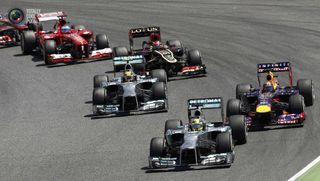Discovery Sets Sights on European Sports

Just weeks after increasing its stake in European sports network Eurosport, Discovery Communications is reportedly pairing with Liberty Global on a possible bid for international racing giant Formula One.
The Formula One move would fit in nicely with the Silver Spring, Md.-based programmer’s recent focus on international sports properties — it accelerated its purchase of a 51% interest in Eurosport last month. International programming has been a bright spot for Discovery in the past several years.
Discovery and Liberty Global are reportedly in early discussions to buy CVC Capital’s 35% stake in Formula One, one of the most popular racing circuits in Europe, with an eye on an additional 14% stake held by the Lehman Bros. estate. A deal could value the racing asset at nearly $9 billion.
Discovery and Liberty Global each declined to comment.
RACKING UP TV RIGHTS
Securing Formula One programming could be a boon for Liberty Global’s Virgin Media distribution arm in the United Kingdom — giving it a leg up against rival distributor British Sky Broadcasting — and also could be a key asset in what has become a growing stable of international sports networks for Discovery, but there is no guarantee a bid would be successful.
With an asset as popular as Formula One, there are likely to be several other bidders, which could drive the price above Liberty’s tastes, and Formula One has expressed a desire to rekindle its plans for an initial public offering. It had attempted an IPO last year, valued at about $12 billion, but scrapped those plans amid uncertainty in the European stock market.
Multichannel Newsletter
The smarter way to stay on top of the multichannel video marketplace. Sign up below.
“I think it’s a long shot,” Pivotal Research Group principal and senior media & communications analyst Jeff Wlodarczak said, adding that he believes there could be a number of players looking at the asset. “But if they [Liberty Global] can get it at a reasonable price it appears to be a durable, long-lasting, high-free-cash-flow asset and would make sense for them.”
While Liberty searches for a deal, Discovery has made no bones about its interest in international sports.
Discovery agreed to acquire a 20% interest in Eurosports in 2012, a group of networks owned by French programmer TF1, for around $240 million. Last month it accelerated a deal to purchase a larger interest, agreeing to increase its stake in the networks from 20% to 51%, and valuing the networks at $1.2 billion.
In 2012, on a conference call announcing the deal, Discovery International’s then-CEO, Mark Hollinger, said the programmer was interested in Eurosport because it carried sports like tennis, skiing, skating and cycling, which have large fan bases but lower license fees.
“A few days a month this is somebody’s favorite channel. It doesn’t strive to be that big massive platform,” Discovery Communications CEO David Zaslav said on the 2012 call. “In general, our business is about aggregating niche audiences.” And the company has said it would look to increase Eurosport’s offerings by acquiring more sports programming licenses.
International has been one of the fastest growing segments in the company — in the first nine months of 2013, international revenue rose 46%, to $1.7 billion; and cash flow increased 31%, to $681 million. International advertising also has been on the upswing, with ad sales rising 91% to $756 million in the first nine months of the year.
GLOBAL TARGET: MALES
Programming spending for international has risen 80% since 2010. In the third quarter — Discovery is scheduled to release fourth-quarter results on Feb. 13 — programming expenses rose about 19%, according to the company.
But some analysts fear that free-to-air networks and competition could cut into that growth going forward. In a research report back in October, Morgan Stanley media analyst Ben Swinburne estimated that international distribution growth would fall from 12% in 2012 to 9% in 2013 and 8% in 2014. Advertising growth would also slow, from 19% in 2012 to 12% by 2014, according to Swinburne.
That could be a main reason for Discovery’s interest in international sports — like their U.S. counterparts, sports teams enjoy high ratings, are virtually DVR-proof and attract the young male audiences that advertisers crave. And in typical Discovery fashion, it is focusing on niche sports that can draw attractive audiences at a fraction of the cost of obtaining rights for big time soccer.
Formula One would be a coup for both Liberty Global and Discovery. While it is unclear just how the network would gain access to programming, it is expected to get at least some races if the Liberty bid is successful.
Formula One operates about 19 races around the globe each year, including high-profile races like the French Gran Prix, and generates about $1.5 billion in annual revenue. Its races are watched by an estimated 450 million television viewers globally each year.
TAKEAWAY
Discovery Communications is stepping on the gas in its international contentacquisition efforts, reportedly eyeing European racing circuit Formula One.
